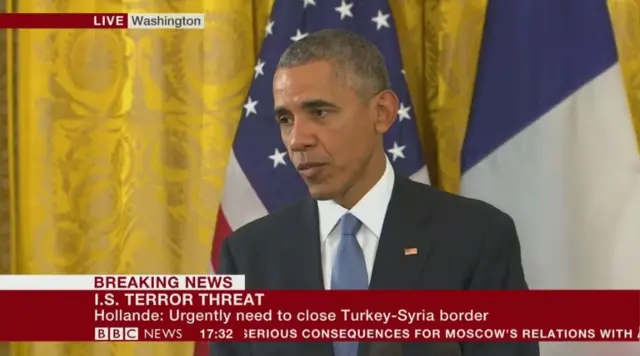Goodnightpublished at 21:00
We are going to close our live coverage for the night. You can continue to follow developments via our main story here:
Turkey says its forces have shot down a plane on the border with Syria
Russia says an Su-24 crashed on Syrian territory after being hit by an air-to-air missile
Turkey says the plane violated its airspace – an accusation Russia denies
President Vladimir Putin calls it 'a stab in the back by the accomplices of terrorists'
Turkey is a member of the Nato alliance, which has said it is ready to defend Turkey if Russia violated its airspace
Paul Blake, Rone McFarlane, Josephine McDermott and Thom Poole
We are going to close our live coverage for the night. You can continue to follow developments via our main story here:
Over the course of the day, BBC journalists have been looking at every angle of the downed warplane story:
 Gary O'Donoghue
Gary O'Donoghue
Washington Correspondent, BBC News
When Russian and US jets came into close proximity over Syria early last month, the Pentagon and the White House were swift to condemn.
"Wreckless" and "irresponsible" were just some of the stiff words they used at the time.
But now that Turkey has actually shot a Russian jet down, there is a tangible reluctance to up the ante, and a scramble to lower the temperature.
Caution is the name of the game, with the Pentagon spokesman, Peter Cook, still saying that the US cannot definitively conclude that Turkish airspace has been compromised.
As a Nato member, Turkey will expect the US and others to back its actions; but with Russia crucial to the prospects of pushing forward a political solution in Syria, de-escalation is the watch word on everyone's lips.
When asked whether the US knows whether the Russian warplane was shot down over Turkey or Syria, Pentagon spokesman Peter Cook said US officers were "not able to conclude definitely right now where the aircraft were".
Echoing those remarks, in an email to the BBC's Gary O'Donoghue, Col Steve Warren, spokesman for the US-led coalition fighting IS, said they were "still analysing the data from the radar tracks".
The US Department of Defense press conference has begun, hosted by spokesman Peter Cook.
The BBC's Gary O'Donoghue has provided some updates from Washington.
The Turkish energy minister, Berat Albayrak, has said that the downing of the Russian warplane does not constitute a threat to energy ties between the two countries.
Turkey is the second biggest purchaser of Russian gas products, according to Gazprom statistics, external.
We are expecting a press conference with US Department of Defense Spokesman Peter Cook from the Pentagon around 14:30 local time (19:30 GMT).
The BBC's Gary O'Donoghue will be providing updates and analysis on Twitter and this page.
One of the two pilots in the shot-down war plane was killed by gunfire from the ground as he parachuted from the crashing jet, the Russian military has confirmed.
Speaking on Russian state TV, Lieutenant General Sergei Rudskoy also said that Turkish aircraft had violated Syrian airspace when it shot down the warplane.
As we reported earlier, Russian military officials have also said that Syrian rebels fired on a Russian search and rescue helicopter, forcing it to land and killing one crew member.
If you're just joining us and hoping to catch up on the latest developments, our colleagues have put together this helpful review:
Turkey's downing of Russian warplane - what we know
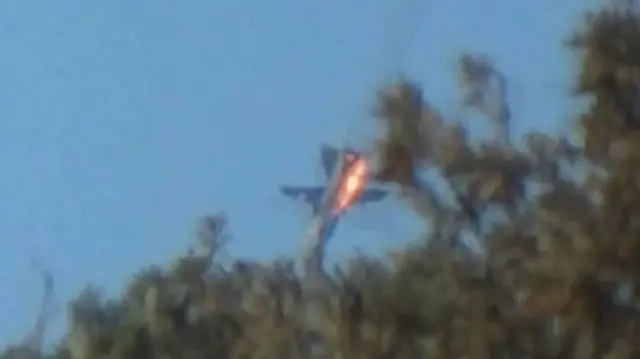 Image source, Reuters
Image source, ReutersBBC Monitoring says that the Russian Defence Ministry has issued a statement saying it will step up its operations in Syria, and "discontinue" military contact with Turkey.
Reading the statement on state TV, Lieutenant General Sergey Rudskoy said "measures will be taken to strengthen air defence" and that "any targets representing a potential danger for us will be destroyed".
He said additional weapons will be deployed to the Latakia area.
Writing in Vox, external, Max Fisher has a counterargument for some of the more apocalyptic assessments of today's events. He says there is little chance of it sparking a wider conflict.
Quote MessageThe stakes are just too low. The things at issue here are Russia's bombing of anti-Assad rebels in Syria, the sanctity of Turkish airspace, and the life of one (or possibly two) Russian pilot. Those things matter, and Turkey cares an awful lot about its airspace and about what happens in Syria. But Russia doesn't care enough about those things to risk a major war. And neither do the leading members of Nato (the US, UK, France, etc), which will largely decide how Nato responds. There is thus every reason to believe that both Russia and Nato will seek to de-escalate."
The Russian soldier killed during a search and rescue mission for the crew of the shot-down warplane was on board a helicopter downed by rebel fire, Russia's military has said.
A military spokesman said it was one of two helicopters taking part in the operation. The rest of the crew were evacuated and taken to the air base used by Russia in Syria.
In the last few minutes, Nato Secretary General Jens Stoltenberg has been making a statement in Brussels.
The Nato chief has backed Turkey's version of the story, and said that an allied assessment shows that the Russian warplane did fly into Turkish airspace.
He said that there had been contact between officials in Moscow and Ankara, but not between Nato officials and Russia.
Mr Stoltenberg called for calm and for the parties to deescalate the situation.
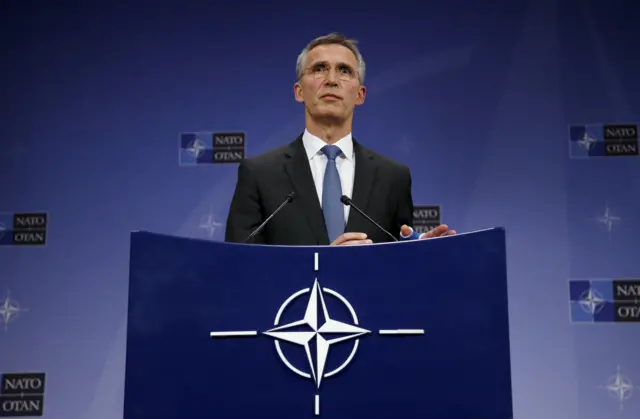 Image source, Reuters
Image source, ReutersA Russian soldier has been killed in the search for the pilots of the downed jet in Syria, the Russian military says.
In his first reaction to his forces' downing of a Russian jet, Turkish President Recep Tayyip Erdogan said "everyone should respect the right of Turkey to defend its borders".
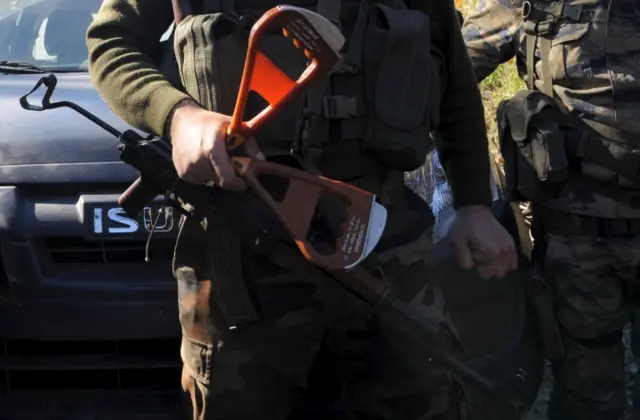 Image source, Reuters
Image source, ReutersAlpaslan Celik, a deputy commander in a Syrian Turkmen brigade, holds the handles of what is believed to be part of a parachute used when the Russian warplane was shot down.
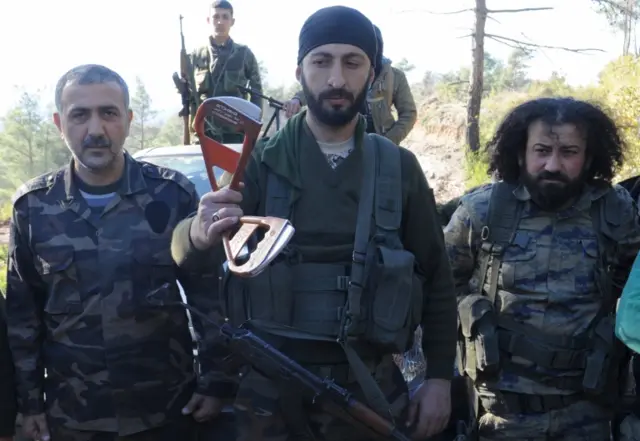 Image source, Reuters
Image source, ReutersEchoing some of Mr Obama's comments, Francois Hollande said "we must prevent an escalation that would be extremely damaging.
"The only purpose is to fight against terrorism and Daesh (Islamic State).
"What took place means that we must find a solution to the Syrian crisis, otherwise there are risks of escalation."
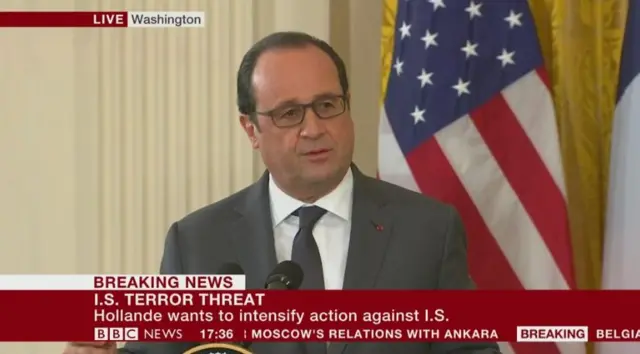
The president adds that he will be travelling to Russia this week.
"I do think this points to an ongoing problem with Russian operations (in Syria)," Mr Obama continued, "in the sense that they are operating very close to a Turkish border and they are going after moderate opposition."
"If Russia is directing its energies towards Daesh and Isil (Islamic State), some of those conflicts or potentials for mistakes or escalation are less likely to occur."
Asked about the downing of a Russian jet, President Obama said he was still getting the details. But he said "Turkey, like every country, has the right to defend its territory and its airspace".
He went on to say it was important for the Russians and Turks to talk to each other and take measures to "discourage escalation".
